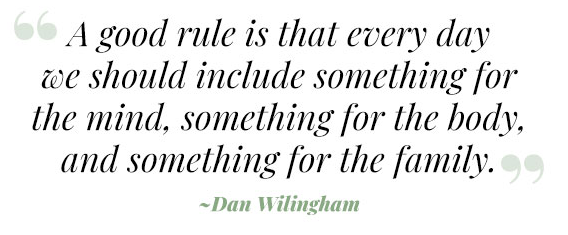COVID Has Changed Everything, Including Parenthood
As we move into summer, many parents will have to address the practical consequences of more than a year of disruptions for their kids.
Jun 02, 2021
As we move into summer, many parents will have to address the practical consequences of more than a year of disruptions for their kids.
Certainly, for many, yet another adjustment will be nothing new. Several members of our community have shared that they never expected their responsibilities as parents to include full-time teaching or having to explain to their children how giving a loved one a hug might make them or their loved ones sick.
Now, with the end of the school year (such as it’s been), it’s a good idea to assess the state of children’s academic progress, their emotional health, and their needs.
Advice from an accomplished psychologist
We recently spoke about those issues with our friend Dan Willingham, a professor at the University of Virginia and specialist in child psychology. He also serves on our Connectivity Council.
Regarding school, he acknowledges that there are people that believe that this has been a “lost year” academically. But he cautions against assuming that your child is behind, because there’s a lot of variation from school to school and kid to kid. He suggests getting in touch with next year’s teacher or the school’s academic coordinator to get a sense of where your child stands and what he or she will need to know when classes resume.
Dr. Willingham also points out that learning extends far beyond the academics. While there’s been a lot of talk about the loss of classroom experience, he notes it’s important to pay attention to other aspects of the maturation process.
Specifically, he thinks it’s a good idea right now to pay heed to kids’ emotional and social development. He says some children might regress which means they either want to stick to Zoom calls and texts or want to leap back into pre-lockdown activities that might seem young for their age but where they knew how to act.
They may need reassurance, too. Dan suggests a little more flexibility on agreeing to drive kids to social activities. He says parents also should pay more attention to the misunderstandings between children and their friends – and perhaps show a greater readiness to jump in to resolve conflict.

Finally, he points out that time often feels like it slows down over the summer, and everyone should be thinking about how to fill those months. A good rule is that every day we should include something for the mind, something for the body, and something for the family.
One activity that we like to do, that Dan says could be beneficial to children, is work with children to “predict the future.” Think about what the next several months might look like and anticipate the future with the information available and discuss how you navigate things together.
Counting on our Connectivity Council
Dr. Chloe Carmichael has discussed with us the lessons children learn while cooking with their parents and how they can be applied to life. Those lessons include preparation, patience, and how hard work pays off with great (and tasty) results.
We are also spending time talking to Dr. George Everly, a professor in the Department of International Health at the Johns Hopkins School of Public Health. He's the author of more than 20 books on stress, disaster, and human resilience.
Stay tuned for additional insights from these remarkable folks over the next several weeks. We would love to hear what has changed for you in terms of your role as a parent.
A dialogue on parenthood
We began exploring the impact of COVID on kids and that’s remained a focus. We hope you will find the discussion helpful as we enter the next phase.
We’re looking forward to working together to create a rich and meaningful dialogue on parenthood. We’ve heard from parents who report positive changes from the lockdowns, such as spending more time with their children. Those parents had more time to take walks around the neighborhood, play games, and discover new hobbies with their children. In other words, they forged new connections that are not only worth continuing, but also celebrating.
But as we give our children and families the attention they deserve, this also is a time to consider and discuss the meaning of Memorial Day, both to our families and to the community. It’s a chance to reflect as families on how much so many have given in war, and an opportunity to ponder commitment to our democratic society in lots of contexts – in terms of military service, yes, but also in terms of what those people who served were standing up for, and how we and our kids can honor them by doing our part, too.
All the best,
Chris and Jim








